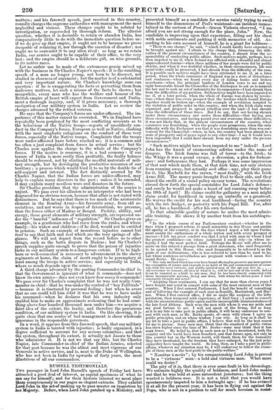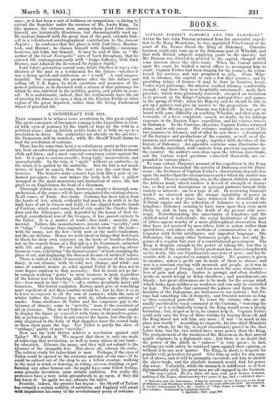RUSSELL TESTIMONIALS.
Two passages in Lord John Russell's speech of Friday last have attracted a good deal of interest, as capital specimens of what he oan say for himself; and for their historic interest we must place them conspicuously in our pages as elegant extracts. They exhibit lord John lathe act of making up to pass muster on inspection by her Majesty. Before, when Lord John patched up a Ministry, and presented himself as a candidate for service vainly trying to well himself to the dimensions of Peel's waistcoat—an incident immor- talized in the cartoon of Punch—Queen Victoria observed, "I am
afraid you are not strong enough for the place, John." Now, the candidate is improving upon that experience, filling out his chest with noble sentiments and padding it with memories of old. Ac- cording to his own account of himself, he is a giant for boldness-
" There is one charge," he said, " which I could hardly have expected to be brought against me : I allude to the charge that, foreseeing the diffi- culties of the present circumstances of the country, I shrank from the re- sponsibility of conducting public affairs. Such motives might, perhaps, have been imputed to me if, when Ireland was afflicted with a dreadful and almost unprecedented famine—when three millions of her people were fed bypublie charity, and when it was doubtful whether, in those circumstances, life and social order could be preserved, I had shrunk from the difficulty of the case. It is possible such motives might have been attributed to rue if at a later period, when the whole commerce of England was in a state of disturbance and confusion—when we heard every day of failing banks and broken merchants—when the principal bankers of London came to me and my right honourable friend the Chancellor of the Exchequer to ask us to suspend the law and to seek an act of indemnity for its suspension—I had shrunk then from the difficulties of my position. Such motives might have been imputed to me if, at a later period, when the whole of Europe was shaken by revolu- tion—when there was every prospect that the treaties which bound Europe together would be broken up—when the example of revolution tempted to the violation of public order in this country, and when the Irish clubs were organized and prepared to spread rebellion over the land—I had shrunk from the difficulties of those times. But I do say, that not having shrunk under those circumstances and under those difficulties—that having met those circumstances, and having passed over and overcome those difficulties, it was not likely that, in the present circumstances of the country, when commerce was flourishing, when the people were prosperous, when the only difficulty with the Exchequer was that it was flourishing more than was con- venient for the Chancellor—when, in fact, the country had been placed in a state of prosperity and of peace equal to any other time—I say it would have been impossible that I could have shrunk from my duty under the present circumstances."
"Such motives might have been imputed to me" indeed! Lord John has the knack of enumerating safeties under the name of dangers. The Irish famine was full of terror—to the Irish; to
the Whigs it was a grand excuse, a diversion, a plea for forbear- ance: and forbearance they had. Perhaps it was some impression of that sort which made them, at that dark time, not only abstain from running away, but actually seek office—nay, play their game for it, like Macbeth for the crown, "most foully," with the Irish
Arms Bill. The money panic brought Peel to their side, and they shared the credit of a sound policy on easy terms. The revolutions abroad drew forth the special constables for Lord John's defence ; and surely he would not make a boast of not running away before the 10th of April ! He claims credit for gallantry as a man might claim credit for hardihood in using an umbrella or a greatcoat. He waives the credit for his real hardihood—facing the country with the late Budget, or posterity with his Papal Bill. For, after all, he has a hardihood—after his own fashion.
To that admirable quality of nature he unites the most admir-
able training. He shows it by another trait from his autobiogra- phy— In the whole course of my Parliamentary conduct—whether in the days when I proposed reform to small minorities in this House and amidst the apathy of the country, or in the days when I urged a bill upon Parlia- ment amidst the enthusiasm of a whole nation and with every prospect of success—I felt my great comfort was that I acted with men in whom I had the greatest confidence—on whose judgment I could rely—in whose in- tegrity I had the most perfect faith. Perhaps the House will allow me to quote on this subject a passage from a great statesman, who used frequently to be quoted in this House, who used frequently to be referred to as the guide of our deliberations, who is less referred to now than he used to be, but whose sentences nevertheless are pregnant with wisdom—I mean Ed- mund Burke. He says— '"The only method which has ever been found effectual to preserve any man against the corruption of nature and example is an habit of life and communication of coun- sels with the most virtuous and public-spirited men of the age you live in All reverence to honour, all idea of what it is, will be lost out of the world, before it can be imputed as a fault to any man, that he has been closely connected with those incomparable persons, living and dead, with whom for eleven years I have constantly thought and acted.' "Adopting those sentiments, I can may that for more than eleven years I have fought and acted in concert with some of the most eminent men of this country. When I first entered Parliament, I had the benefit of consulting and of following the example of such men as Romilly, Mackintosh, and Hor- ner. When I first entered office, I did so under the auspices of the lofty patriotism, then tempered with experience, of Earl Grey ; I acted in concert with the unostentatious public-spirit and the incorruptible disinterestedness of the late Lord Althorp. Such were the men with wham it was my pride and my good fortune to act. I will not speak of the living, but so long as it is my fate to take part in public affairs, it will be my endeavour to con- sort with such men as Mr. Burke speaks of—men with whom I ag-ree on public principles, and on whose wisdom I can rely. As long as it shall be may lot to take a part in public affairs, I believe that will be the best course for me to pursue. Some men may think that the standard of public virtue has risen higher since the time of Mr. Burke—some may think that it has sunk lower. My belief is, that by such men as I have mentioned, both the country and the world have been benefited, and that future ages, not only in this country but in the Western world, will thank them for the humanity they have inculcated, for the freedom they have enlarged, for the just prin- ciples they have taught the world. So long, then, as I take a part in public affairs whatever my situation may be, I will endeavour to follow the exam- ple oethose men as the best guide to the public welfare."
" Noscitar è. sociis "; by his companionship Lord John is proved to be a " virtuous " man—a bold and virtuous man. What more could we desire P
The pity of it is that there is ever some fault in his chronology. We estimate highly the quality of boldness, and Lord John makes out that he was bold at some antecedent junctures; but the thing wanted is boldness now. It is not a trait that you would have spontaneously imputed to him a fortnight ago : if he has evinced it at all for the present year, it has been in flying out against the Pope, who is not in a position to call for much heroism in resist, anee ; or it has been a sort of boldness on compulsion—a daring to extend the franchise under the coercion of Mr. Locke King. In like manner, the virtuous men, among whom Lord John classes himself, are historically illustrious, but chronologically used up. He reckons himself with the great men of the past, entombs him- self in a volunteered autobiographical contribution to the Annual Register : he confesses that his place is with Earl Grey, Mackin- tosh, and Homer; he classes himself with Romilly,—meaning, however, not John, but Samuel. It may be said of him, as "the author of the Great Necropolis" says of Lord. Brougham, that he entered life contemporaneously with "Judge Jefferies, little Jack Horner, and Admiral the Reverend Sir Sydney Smith."
Lord John's peroration caused some doubt whether it was a vin- dication of the past or a testimonial for the future—whether it was a dying speech and confession, or " a card." A card unques- tionably. On reopening his premises after the late failure and selling off, X. R. hopes, by fresh exertions and measures of the newest patterns, to be favoured with a return of that patronage for which he was indebted to the nobility, gentry, and public in gene- ral. It is unfortunate, indeed, that his testimonials have the air of proving his fitness to open a shop in the Elysian Fields or other region of the great departed, rather than the living Parliament Street of practical life.



























 Previous page
Previous page